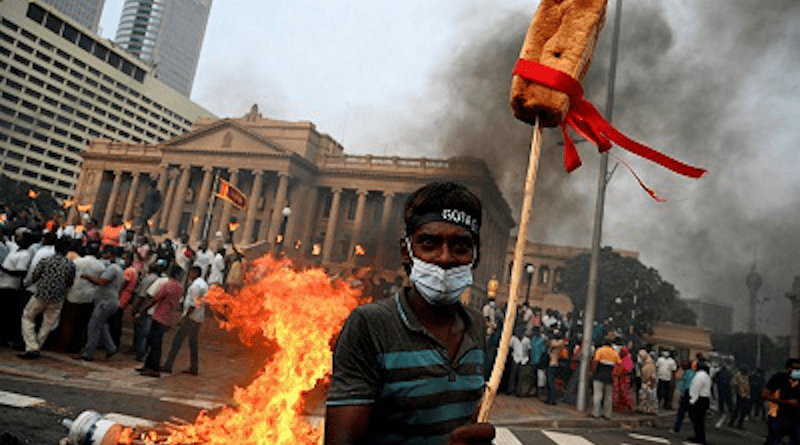‘Occupy Temple Trees’: Sri Lanka’s Disgruntlement Towards Neo-Elites Is On Cards Next – Analysis
Amidst an economic crisis, Sri Lankan people stormed into and occupied the President’s House and the Temple Trees, the palatial palaces of the President and the Prime Minister, respectively, forcing both to resign, resulting in a political crisis. Gotabaya Rajapaksa fled the country and is still on the run hoping for political asylum, whereas Ranil Wickremasinghe, the former prime minister, has been appointed as an interim president as the opposition parties are figuring the way out. The experiences from the previous decade’s Sri Lankan politics suggest the reasons as more political than economic.
The economic crisis results from a deep political decay that has engrossed its polity. The impression we obtain from the protest sites is an amalgamation of the Sri Lankan population transcending class, caste, or ethnic diversity to rightfully reclaim a democratic Sri Lanka of the people, for the people, and by the people. Though the people’s fury right now is an expression of their discontentment towards the Rajapaksa dynasty for ruining Sri Lanka’s stability through corruption and reckless decision-making, it offers a vivid signal to the neo-elites for their comradery that facilitated such a crisis.
The Lankan political system was engulfed in a severe systemic and legitimacy crisis due to the Tamil insurgency, which was followed by thirty years long civil war which ended in 2009. The Rajapaksa brothers were celebrated as war heroes in the post-civil war Sri Lanka as they led the war from the frontline, ensuring the complete elimination of the LTTE. The heroic image enabled the Rajapaksas to establish unequivocal authority over Sri Lanka by encashing Sinhala majoritarianism wrapped in populism. However, the Rajapaksa regime facilitated the rise of neo-elites who were quite distinct from their predecessors and engaged in conditioning the society with a new elite culture that was more damaging to the island’s structural integrity and institutional stability.
Since its independence in 1948, Sri Lankan society has been characterized by its deep-rooted elitism. It is not communal violence but politics played by the Tamil and Sinhala elites that led to horrific ethnic violence and 30 years long civil war between the government and the Tamil Tigers. The Tamil minorities in Sri Lanka enjoyed a privileged position under British colonial rule. As a natural response, post-independent Sri Lanka tried to improve the condition of the Sinhala majority. Making Sinhala the state language in 1956 would have been a natural response post-independence for enabling the localization of governance as it was a demand of the majority Sinhala community since 1815.
Disturbed by the decision, Tamil elites interpreted this attempt to deprive the Tamils of their right to work in their mother tongue. This was when Tamils were 10% of the population, and the Sinhalese were 90%. Even making Tamil one of the working languages would not have solved the problem in 1956 and after because both the Tamils and majoritarian Sinhalese never been ready to reconcile. This decision crushed the Tamil elites, who lost their civil and political power after universalizing free education and voting rights. Furthermore, the Sinhala elites, such as Senanayakes and the Bandaranaikes, with their Sinhala identity and socialist or conservative stints, managed to preserve their status.
The domination of elites in post-independent Sri Lanka was not limited to the majority Sinhalese and Tamils but also found in Muslims and Burghers. They were mainly from the English schools in Colombo, Oxford, and Cambridge, educated and followed a luxurious lifestyle. Most importantly, they were highly divorced from the ordinary Lankan population and their concerns while managing the socio-economic and cultural development of post-independent Sri Lanka. The traditional elites assisted the colonial masters in various capacities as middlemen mediating between the alien rulers and the indigenous population. They were the landowners when the British left and embraced the plantation industry as the new mercantilist class. Though these elites were characterized by snobbishness and conceit in substance and capability, they were sound and well-equipped.
The development of social democracy in the latter half of the 20th century gave birth to a new group of elites marking their transformation from one class to another. The remnant of traditional elitism is still available close to the corridors of power represented by those who serve in the prestigious civil service. Otherwise, the new elites control the socio-economic and cultural space and enjoy the same weightage and influence as the traditional elites. The new elitism is characterized as newly rich, wrapped in a patriotic flag, close to the political masters.
Rajapaksas’ role in eliminating the Tamil insurgency brought unconditional support from the neo elites that legitimized the power consolidation within the family. Moreover, the ambitious neo-elites embraced the mythical development story supported by the Chinese. Despite the fallacies, traditional elites preferred to play the game by its rules and looked for method in the madness. Nevertheless, the neo elites established their space and preserved it by singing eulogies to the modern kings. As the protest calls out the extravagant and pompous lifestyles of the leaders, the next target would be the neo-elites whom the ordinary population finds parasitic in the Sri Lankan political system.
Through their historic occupy the temple trees movement, the Sri Lankan people have reclaimed their democratic nation by peacefully overthrowing the Rajapaksa dynasty. However, discontent towards the system may not stop with a smooth power transition with or without elections. What awaits Sri Lanka, and rightfully so, is a complete revision of the power alignment and functional reforms that ensures transparency, inclusivity, and effective good governance. Rajapaksa clan may go, but the elitism that nourished the current political culture is there to stay like the sword of Damocles on Sri Lankan democracy. As the protesters claim to continue the protest the elites could be their next target unless transparency is assured in the political solution.

